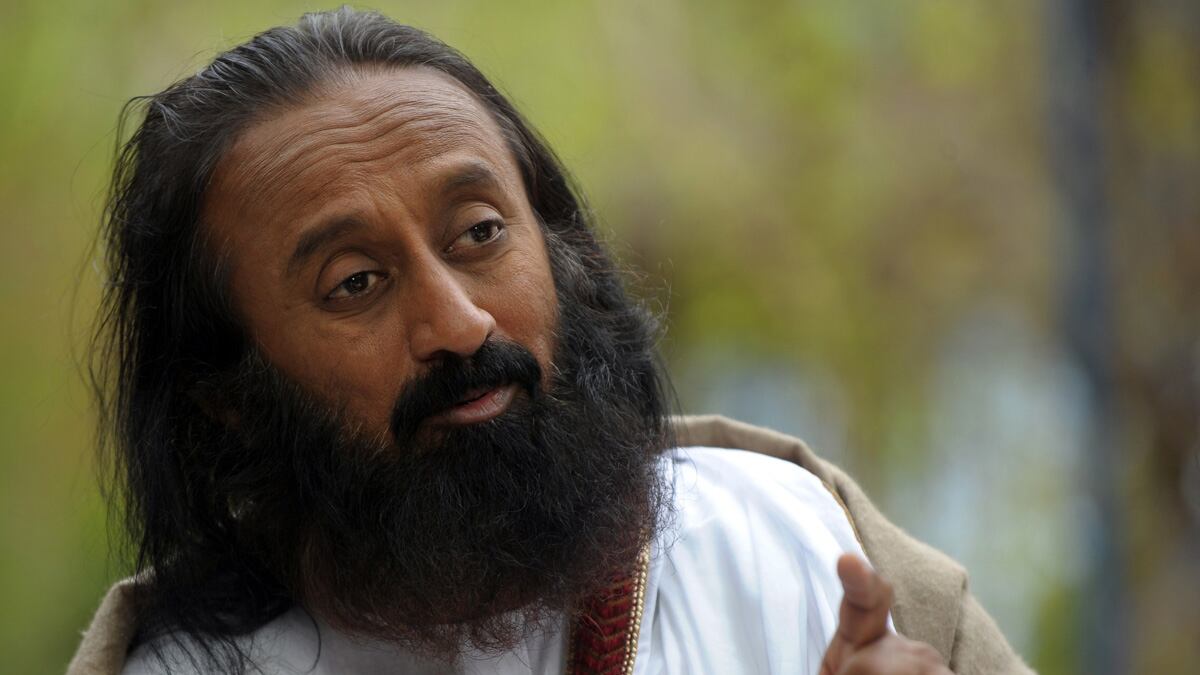This week, as the Taliban announced they had pulled out of peace talks with the United States, an Indian spiritual guru revealed his plans for an unusual journey: a peace mission to talk to the Taliban in Pakistan. He would, he promised, try to help the fighters find inner peace.
“All those who fight have fear and concerns; they want to feel valuable,” Sri Sri Ravi Shankar, whom Forbes has described as the fifth most powerful man in India, told The Daily Beast in an interview Friday. “Our techniques give them a sense of well-being and calmness, and once the inner calmness happens, the feeling of wanting to fight and the urge for revenge disappears.”
Shankar is the founder of the Art of Living, a Bangalore-based movement, which espouses breathing techniques, meditation, and yoga as ways to overcome violent tendencies and which claims to have millions of followers worldwide and around 5,000 in Pakistan. While his plans are preliminary, Shankar hopes to send Art of Living followers to meet with Taliban fighters in the Pashtun areas inside Pakistan.
“We want to talk with the Taliban in Pakistan,” Shankar said. “We’ll go in with an open mind, to find out who they are, their problems and their intentions—that has always been my approach.”
Shankar announced his desire “to stretch my hands to Talibans” during a visit to Pakistan this week. In Lahore, the guru addressed a crowd that included Sartaj Aziz, a Pakistani economist and the former foreign and finance minister, and a leader of the Pakistan Muslim League. After inaugurating the country’s first Art of Living center in Lahore, Shankar then traveled on to Islamabad and Karachi to open centers in each place. It was his first visit to the country in eight years.
Spiritual leaders have historically had significant impacts on seemingly intractable situations—from priests in Northern Ireland to rabbis in Israel to friars in Bosnia, said David H. Young, a Washington, D.C.-based analyst of international conflict. But he cautioned that the most successful peace builders have often been indigenous; the fact that Shankar is not Afghan or even Pashtun could undermine his success in the region.

“A genuine Taliban commander in Afghanistan or Pakistan would be as reluctant to meet with Shankar as he would be to meet with Pat Robertson,” says Young. “The two men are identical in the eyes of the Taliban.”
Shankar contends that a humane, personal approach could succeed at a moment when more official diplomatic efforts have broken down. “Conflict rises in the head, in the individual—it spreads to the community,” he says, adding that his position as a “neutral party,” neither representing the Judeo-Christian side nor the Muslim side, could provide a different point of view.
He cites Pakistan’s November 2011 decision to grant India “most favored nation” status as a hopeful sign of progress in the region. “There have always been barriers in Pakistan, but this time, I felt some lifted—there was a cordial, very open reception.”
For this reason, Young suggests that Shankar could be most effective by beginning to mediate within his country’s own borders: “[His] impact would be greatest if he tried to convince Delhi to make meaningful concessions at the negotiating table with Pakistan over Indian-occupied Kashmir,” he says. “That task is difficult enough as it is—both for religious and secular advocates—and there aren’t enough people doing it.”
Which is one possible way that the movement Shankar now sees as starting with an individual Taliban soldier’s stress level could also, eventually, have a geopolitical domino effect. “If tensions are reduced [between India and Pakistan], Pakistan will have less reason to train and support Islamist militant groups like the Taliban, which are a buffer in its Western hemisphere,” says Young. “Ultimately, India holds the cards for a peaceful Afghanistan.”






